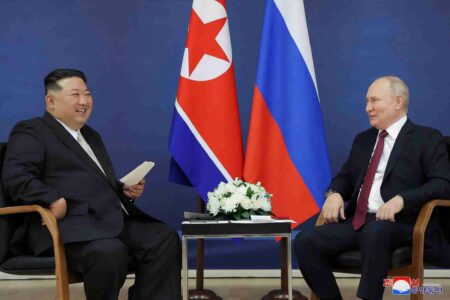Written by Uriel Araujo, researcher with a focus on international and ethnic conflicts
North Korean leader Kim Jung Un unexpectedly extended his visit to Russia. Russian President Vladmir Putin and his North Korean counterpart met on September 13 to reportedly discuss bylateral cooperation and after the five-hour meeting at the Vostochny Cosmodrom, it has become clear the ongoing discussions include military and technical cooperation. For one thing, Putin has vowed to help the East Asian nation develop satellites, and accepted Kim’s invitation to visit the Democratic People’s Republic of Korea (DPRK) – Russian Foreign Minister Sergey Lavrov is also to visit the country in October, according to spokesman Dmitry Peskov. Kim in turn vowed to bring about “a new era of 100-year friendship” between the two states.
The DPRK has been struggling with heavy sanctions for a long time and suffered the impact of pandemic related border closures – which have been relaxed recently.
US State Department spokesman Matthew Miller threatened by saying the US would “not hesitate to take action” if Pyongyang provided weapons to Moscow. In response, the Kremlin said that Russian and North Korean interests mattered, “not warnings from Washington.” There are however “certain limitations” to Russian-North Korean military cooperation (to which Russia complies), as Putin himself acknowledged, probably referring to UN Security Council resolutions which Moscow voted for in the past. Even so, there are many points of cooperation to be explore – the challenge will be to navigate the aforementioned limitations.
On September 14, the national security advisers of Japan, South Korea, and the US jointly issued a warning pertaining to Russian-North Korean cooperation, thereating that there will be “clear consequences” if United Nations Security Council resolutions are breached. The White House said US National Security Advisor Jake Sullivan had talked with his South Korean and Japanese counterparts to discuss the Putin-Kim meeting.
Last year, amid the US-Japan-South Korea summit, I wrote on how frictions were escalating in the Korean peninsula, but also involved Russian-Japanese tensions. At the same time, Washington’s new stance on Taiwan added fuel to the fire. There is in fact another angle to Russian-North Korea discussions about strengthening military ties: they are about diversifying partners as much as they are also a response to US-Japanese-South Korean Pacific developments and Aukus.
Much is talked about the Quad (the “Asian NATO”) described by Lavrov as a US-led policy aimed against China. From a Russian perspective, however, this initiative – together with the overall American “Indo-Pacific” policy, also affects balance in a web of state relationships in Asia. Thus, for Russia, engaging with North Korea is arguably also about balancing US-Japanese-South Korean influence in Asia.
For example, over two years ago, I wrote on how Biden’s approach to the DPRK had been a setback – this was so largely due to the fact that Washington saw any interaction with the country as “unacceptable” nuclear negotiations – and such an approach was hardly an incentive to bring Pyongyang back to the table.
Nothing much has changed in that regard. As I wrote, in 2021, talks with the US were (and still are) very unlikely to deliver much, the nuclear issue being a true impasse – this being so, a natural path for North Korea would be to enhance its bilateral relations with Moscow, who, after all, has always been critical of the sanctions against Pyongyang: even though Russia did join the 2013 sanctions against the Asian country (in line with UN Security Council Resolution 2087), talks about setting up an advanced “development zone” in the Russian Far East and North Korea started in 2015 – this being a sphere of cooperation free of the scope of sanctions back then. Li Haidong, a International Relations of China Foreign Affairs University professor wrote, also in 2021, that the Russia-China-North Korea trilateral relationship had the potential to advance regional stability in the region.
Although there has been a common will towards stability and peace in the Korean peninsula, Biden’s administration has largely been a hindrance. In any case, engaging with North Korea and “controlling” its existing nuclear arsenal is a much more realistic goal than full denuclearization. The hard reality is that Pyongyang has achieved nuclear power and will not let it go; thus, engaging with the DPRK is the only reasonable approach. In a way, this is also what Moscow is doing right now. To sum it up, the Russian strategy for the Korean peninsula should not be seen merely in the context of the ongoing conflict in Ukraine and arms deals but should also be seen from a larger geopolitical perspective.






